Today we will talk about the book “Karma Yoga,” which tells the thoughts of Swami Vivekananda on Karma.
The real name of Swami Vivekananda was Narendranath Datta. He was born in a wealthy and religious Bengali family in Kolkata on January 12, 1863. He completed his studies at Presidency College. He was not only a great saint but also a patriot, a great time, a philosopher, and a great writer. He died while meditating on July 4, 1902.
Swamiji was very dedicated to the matter of ‘Karma’. He always said, “One needs to be practical to deal with any work. Too much theory has destroyed the whole nation.”
In Karma Yoga, he has presented ‘Karma’ as mental discipline and guidance for increasing knowledge. Describing the facts of Bhagwat Gita in short, Swamiji has defined the essence of ‘Karma’ and its importance in life.
Today we will talk about the thoughts of that great man of knowledge, soul, and inspiration for the ideal of youth.
So, this article, we are going to summarize the book for you, so if you don’t have time to read the whole book, read the article carefully, and absorb it’s wisdom.
Who are we? The power to be whatever we want to be. It is in us. If our present form is the result of our past actions, then indeed, by our current efforts, we can also create our future form. So we should learn to act.
What Is Karma Yoga?
Karma Yoga is often called the yoga of cause and effect or the yoga of sowing and reaping, but it is the yoga of work. Any action, any thought, by doing something is called karma. Thus, the law of karma means to act or to take action.
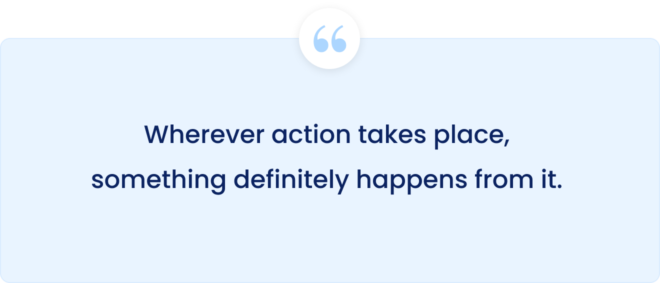
Because wherever the action takes place, something happens from it. This truth cannot be denied, and this law of karma is valid throughout the Universe.
Karma Yoga is a mental discipline that asks a person to serve the people by fulfilling his work through knowledge. We learn about the secret of working, the way of working, and the power to work through Karma Yoga.
We learn how to use everything in this world. Karma Yoga tells us that, to find a way out of the world’s shackles, we must understand and adopt it slowly and surely.
Swami Vivekananda says that karma is derived from the Sanskrit word ‘kri‘, which means to do – to act.
Technically, the word also means to do something. But in Karma Yoga, we have to take desired results from the word karma itself. Therefore, all actions are karma, from the most basic tasks, such as brushing teeth, to the highest altitudes, such as meditation.
Karma Yoga means all those human activities done with focus, skill, and finesse. And the way of salvation in life is to perform one’s duties without the greed of getting anything. So, in the Bhagavad Gita, Shri Krishna advises Arjuna (all mankind) to do his work honestly and with the best skill, without any greed or expectation of rewards.
So let’s talk about the valuable thoughts about Swami Vivekananda and the similar karma of the Bhagavad Gita.
Chapter 1: Swamiji’s Thoughts on Karma and Character
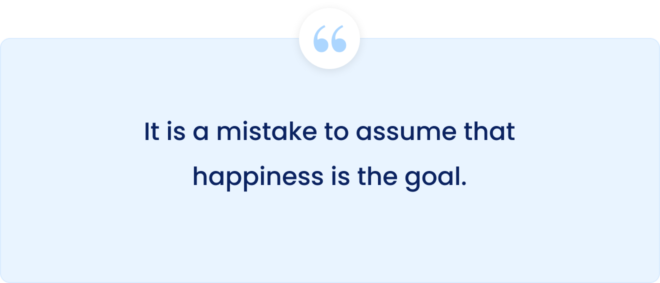
Swamiji says it is a mistake to assume that happiness is the goal. Our miseries in the world are because human beings try to make happiness the best condition without understanding.
But after some time, they find that it is not happiness, but knowledge, towards which they are heading, which makes them happy. And that pleasure and pain are great teachers.
As happiness and sorrow pass through life, they leave different impressions, and the result of these total impressions is what is called the “character” of the human being.
If you look at the character of any human being, it is a combination of different things. The sum of the inclinations of mind or way of thinking; You will find that both sadness and happiness play an essential role in creating character.
Swamiji says that there is an equal share of good and evil in the making of character, and in some cases, sadness is a better teacher than happiness. When knowing about the people, it will be found that suffering taught them more than happiness; poverty taught them more than wealth.
Now, here again, the thing is that this knowledge is again inside the human being. No knowledge comes from outside. It’s all inside. So whatever innovation a person makes, it already exists.
When we say that Newton discovered gravity, what we need to think here is, was he sitting in the corner waiting for him? Or, it came to his mind, and he worked with time to find out.
All the knowledge the world has received so far comes from the mind. The never-ending library of the universe is in your mind. The outside world is just a suggestion or opportunity, which inspires you to know about your mind, but the purpose of your learning is always to learn more and more about your mind.
The fall of an apple gave Newton the idea of gravity, and he began to learn about his mind. He began to link all the previous links of thought in his mind and discovered a new connection between them, which we call the law of gravitation.
If we really look, gravity was not in the apple, the center of the earth, or anything else. That is under knowledge, spirituality, and in the human mind.
In many cases, it is not discovered but remains covered. When the layer of ignorance over it is gradually removed, the process of learning thus progresses through the process of learning and revealing the truth. The person from whom this veil is released is more knowledgeable. But the person on whom this veil is lying is ignorant.
Like fire in a piece of shining stone, wisdom exists in the mind. The idea is the process that brings it out. So with all our feelings and actions, our tears and our smiles, our joys and our sorrows, our cries and our laughs, our curses and our blessings, our praise and our lack, we can find each of them.
Every mental and physical trouble which is given to oneself to gain power and knowledge is called karma. If we use this word in a meaningful sense, then in a way, we are doing all work or karma.
Swamiji says I am talking to you: this is karma. You are listening: this is karma. We breathe: that is karma. Everything we do, whether in body or mind, is karma, which leaves its mark on us.
Some tasks are small in the beginning and become very big at once. For example, if we stand on the shore of the sea and hear the waves hitting the coast, we feel what a great noise it is.
Still, by watching and listening carefully, we know that a wave is made up of millions of minute waves, and each one of them is making noise, yet we can’t catch it.
Similarly, by continuously doing many small things together, we become so powerful that we can do something impossible in the present or future through them.
Similarly, every beat of the heart is work; some work which we feel, and they become fixed for us. They are the sum of many small things simultaneously.
So, if you want to decide whether a person is good or bad by looking at his character, then don’t just look at his great visible values but both aspects because every fool can become a hero at some point.
Watch a man doing his most ordinary things. Because these are the things that will tell you about the true character of a great human being.
Excellent opportunities also inspire human beings to become great in some way or another. Still, in reality, they are great human beings whose character is always great, that is to say, who are honest in all their appearance and inner work, wherever they may be.
We are what our thinking has made us. So be mindful of what you think. Words are necessary. Whatever you believe, you are that. If you feel weak, you will be weak.
If you consider yourself powerful, you will be powerful. If you think yourself inferior, you will be of use to someone. If you consider yourself holy, you will be blessed.
To be successful, you must have tremendous determination and tremendous willpower. So whatever people want to say, stick to your faith and have faith that the world will be at your feet. Vivekananda says many people say, ‘Trust this partner or that partner’, but I say, ‘Believe yourself first’.
If you are pure and robust, you are a man equal to the world.
Chapter 2: Everyone Is Great In His Place
Teaching this principle of Karma, Swamiji says that a part of the principle of Karma Yoga is activity. Duty is according to the activity. What is not a duty to one is a duty to another. At the same time, it is also incorrect to think that this duty is small and the other is high.
If a man takes sannyasa from the world to worship God, he should not think that those who live in the world and work for the good of the world are not worshiping God. Nor those who live in the world, the wife and the children should think of them, that those who renounce the world are lowly or vagabonds. Because each one has his place and value in his life and people’s life, which one can fulfill only through one’s work.
Chapter 3: The Secret of Karma
Helping others with the body, taking away the needs of their body, is indeed great, but the more significant such help is, the greater it is, and the farther the service is given, the greater the benefit to the other.
Still, if, in some way, one’s desires can be taken away forever, that is the most significant help that can be given.
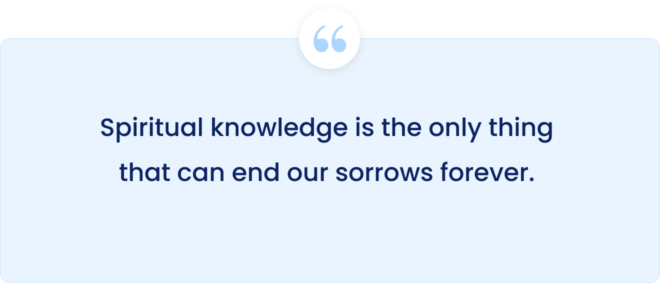
And spiritual knowledge is the only thing that can end our sorrows forever. Any other knowledge fulfills our needs only briefly. With the knowledge of the soul, the trouble or negative power of always lacking in life gets destroyed forever. So spiritually helping a person is the most significant help that can be given to him.
Those who give spiritual knowledge to people will be of most important benefit to mankind, and thus, we always find that they were and are the most influential people. Who help people with their spiritual needs because spiritual life is the base of all our activities. A spiritually strong and healthy person, if he so desires, will be vital in every respect.
Without spiritual power in a human being, even physical needs cannot be fulfilled. Mental help comes before the spiritual. The gift of knowledge is far better than food and clothing.
It is more than giving life to man because man’s real life is from knowledge. Ignorance is death; knowledge is life. Life is of little value if it is life in the darkness of ignorance. The next stage comes to help a man with grace.
Therefore, when considering the question of helping others, we should always try not to think that physical help is the only help that can be given.
It is not only the last but also the least because it cannot bring permanent satisfaction in one’s life. One’s misery can only end when satisfied with all his desires. Then hunger will not make one sad. No trouble. No sorrow can shake. So, the help that makes us spiritually strong is the highest, followed by mental help and then physical help.
Chapter 4: What is Duty?
When reading about Karma Yoga, it is essential to know what duty is. If I want to do something, I must first understand that it is my duty, and only I can do it. Again the idea of duty is different in different countries.
Muslims say that what is written in their book, the Qur’an, is their duty. Hindus say that what is in the Vedas is their duty, and Christians say that what is in the Bible is their duty.
In this way, we find that there are different thinking about duty, various situations in life, different historical works, and different according to foreign nations. The word “duty”, true to all and every other word, is impossible to define clearly. We can get an idea of it only by knowing its practical operations and results.
When certain things are in front of us, we have a natural or learned way to act in a fixed manner for them. When this method comes, the mind starts thinking about that situation. Sometimes it feels good to work in a particular way under given conditions. Sometimes, it feels wrong to act in the same way, even in similar situations.
In the last century, India had infamous gangs of robbers called thugs. They considered it their duty to kill a human being, and they did what they could and took away his wealth. The more people they killed, the better they thought they were.
Generally, if a person goes to the street and shoots another person, he can be insulted, thinking he has done wrong. But if that same man, as a soldier in his regiment, kills not one but twenty, he will be happy and think he has done his duty very well.

So we see that not just work defines a duty. Thus it is entirely impossible to give a precise definition of duty. Yet the personal duty is that any work that leads us to God is a good deed, and it is our duty. Any work that brings us down is wrong and not our duty.
From an individual point of view, we can see that in some work, we have the power to exalt and respect, while in other jobs, we tend to humiliate and do wrong to us.
However, there is only one idea of duty which is regarded as the unalterable truth by all humanity, all ages and religions and nations, and which is stated as: “Any living being It is a virtue not to injure someone, it is a sin to hurt any living being.”
Chapter 5: We Help Ourselves, Not The World
Our duty is to help others and do good to the world. But we should do good to ourselves. Why should we do that?
To help the world, but actually to help ourselves. Of course, we should always try to help the world; that should be our most significant motive, but if we think well, we find that the world does not need our help. This world is not made because you or I come and help it.
We should do well because the desire to do good is our most significant driving force. God gives us if we always know that helping others is a special right.
We can stand in some high place. So don’t say, “Here, my poor man,” with five cents in your hand, but be grateful that he is the poor man so that you can help yourself by gifting him, for it is not the taker who is blessed but the giver.
So be grateful that you have been given the power and permission to do good to your people in the world and to use the power of kindness, and by thinking and acting in this way, you become holy and perfect, that is, the person who fulfills all desires.
This is the only way we can become perfect. We do not owe even a cent to any beggar we have helped; Rather, we are all indebted to him because he has permitted us to give our charity to himself.
It is entirely wrong to think that we have done or can do good to the world or to feel that we have helped more such people. Because it is a stupid idea, and all foolish thoughts bring misery. We have helped a man and hope that he will thank us, and if he does not, sorrow comes to us.
Why should we expect anything in return for what we do?

Be grateful to the man you help; think of him as a God. Isn’t it a great honor to be allowed to worship God by helping others around you?
If we were to be genuinely unattached, that is, wanting something without return, we should avoid all this pain of extravagant expectation and happily keep doing good in the world. And what is done without hope will never hurt. So the world will go on with its joys and sorrows for eternity.
Chapter 6: Freedom
The high-level types of people quietly collect true and noble ideas, and others – Buddha and Christ – move from place to place and preach and work for them. In Gautam Buddha’s life, he constantly says he is the twenty-fifth Buddha. The twenty-four before him are unknown to history, although the Buddha knew that history would be built on the foundations laid by him.
The most incredible people are quiet, silent, and unaware. They are the people who really know the power of thought, and they are sure that even if they go into a cave and close the door and think only five true thoughts and then leave, these five thoughts of theirs will live on for eternity.
Such thoughts will enter the mountains, cross the oceans, and spread worldwide. They will penetrate deep into the human heart and mind and elevate men and women who give them practical guidance to do well in human life. To be so active and to fight, to work, to struggle, to preach, and to do good are very close to God; as they say, he has come for humanity here on the ground.
There is still some ignorance left in those who actively take action, however good they may be. On thinking and finding that there are still some shortcomings left in our knowledge, only we can work.
There is no other duty for those whose natural desires are absorbed in the soul, whose passions are confined, and who are permanently attached to the soul. Such people are indeed the tallest in the human race.
While doing so much work, we should never think we can help, even with the most minor thing in this Universe. The truth is we can’t. So instead, we only allow ourselves in this practice ground of the world.
If we act with this thought and always remember that our present opportunity to work like this is a special right given to us, then we will never get attached to anything.
Millions of people like you and me think we are the great people in the world. But we all die, and in five minutes, the world forgets us. But the life of God is infinite.
By his command, the wind blows, the sun shines, the earth lives, and death comes. He is in all and everything. We can only worship him.
Therefore, leave all the fruits of the work; do good to yourself. Only then will the fulfillment come. In this way, the shackles of the heart will be broken, and we will feel completely free. This liberation is the goal of Karma Yoga.
Conclusion
So, friends, this is Swami Vivekananda’s thoughts on Karma. We hope you learned many essential things about Karma. Now adopt them in your life, and while improving the quality of your deeds, keep moving towards a good life.
Finally, if you feel this summary can help others, please share it with them. We will meet soon with even more improved summaries.
Karma Yoga Book Review
“Karma Yoga” by Swami Vivekananda is a profound spiritual book that explores the path of selfless action.
Vivekananda eloquently explains the concept of Karma Yoga and its relevance in contemporary life. He emphasizes the transformative power of selfless service and how it can lead to spiritual growth and realization.
The book offers practical guidance on integrating selflessness into everyday actions and highlights the importance of detachment and surrender to a higher purpose. With its blend of ancient wisdom and modern relevance, “Karma Yoga” provides valuable insights for those seeking a fulfilling and purposeful life.
Thank You!
Contents


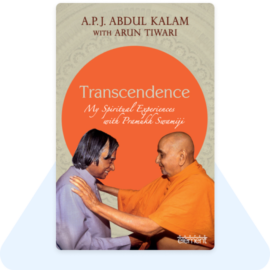
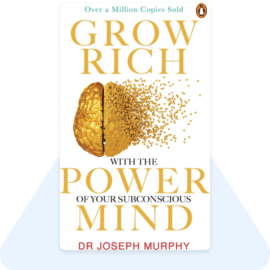

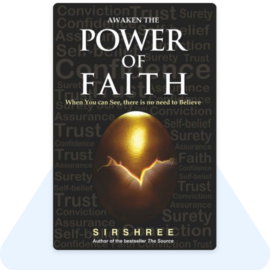


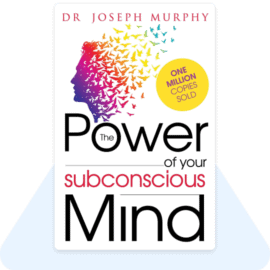
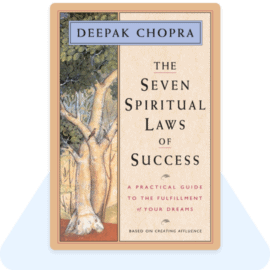




Swamiji says Everything we do, whether in body or mind, is karma, which leaves its mark on us.
The never-ending library of the universe is in your mind.
We are what our thinking has made us. So be mindful of what you think. Words are necessary. Whatever you believe, you are that.
Ignorance is death; knowledge is life.
Leave all the fruits of the work; do good to yourself.